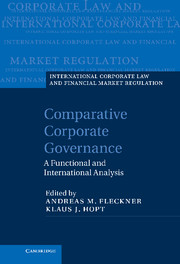Book contents
- Frontmatter
- Contents
- Contributors
- Preface
- Abbreviations
- Part I General report
- Part II National reports
- A Australia and Asia
- B Europe
- 6 Austria
- 7 Belgium
- 8 Denmark
- 9 Finland
- 10 France
- 11 Georgia
- 12 Germany
- 13 Hungary
- 14 Luxembourg
- 15 Netherlands
- 16 Norway
- 17 Poland
- 18 Portugal
- 19 Spain
- 20 Switzerland
- 21 United Kingdom
- C The Americas
- Part III Annex: Questionnaire
- Index
- References
11 - Georgia
Corporate governance of business corporations
from B - Europe
Published online by Cambridge University Press: 05 July 2013
- Frontmatter
- Contents
- Contributors
- Preface
- Abbreviations
- Part I General report
- Part II National reports
- A Australia and Asia
- B Europe
- 6 Austria
- 7 Belgium
- 8 Denmark
- 9 Finland
- 10 France
- 11 Georgia
- 12 Germany
- 13 Hungary
- 14 Luxembourg
- 15 Netherlands
- 16 Norway
- 17 Poland
- 18 Portugal
- 19 Spain
- 20 Switzerland
- 21 United Kingdom
- C The Americas
- Part III Annex: Questionnaire
- Index
- References
Summary
Introduction
Georgian legislation does not contain a clear definition of corporate governance. However, the term in the legal literature is interpreted as a set of relationships between company boards, shareholders, and stakeholders to facilitate achieving the objectives of the company, as well as to establish an adequate monitoring system of company performance. According to the definition set forth in the voluntary Corporate Governance Code for Georgian Commercial Banks (2009):
Corporate governance is the unified system of a company's management and control that determines the allocation of rights and responsibilities among governing bodies, executive bodies, shareholders, and stakeholders. Corporate governance covers rules and procedures for decision making and for monitoring the efficiency of a company's performance.
Briefly, corporate governance is explained as an internal mechanism to direct corporate activity.
Georgia does not have a unified legal act concerning corporate governance. The relevant rules of conduct are defined in a number of laws; Georgian Law on Entrepreneurs (1994) (“GLE”) and Georgian Securities’ Market Law (1999) (“GSML”) make up the most significant part of the relevant Georgian legislation. Reporting corporations mainly fall within the ambit of GSML. The securities market behavior of the reporting corporations is also regulated by the rules of the Georgian Stock Exchange. The Georgian Law on Activity of Commercial Banks supplemented by a range of regulations issued by the National Bank of Georgia deals with corporate governance aspects of the commercial banks. Moreover, the Association of Banks of Georgia in cooperation with the International Financial Corporation (“IFC”) and the Georgian Stock Exchange (“GSE”) recently issued a voluntary Corporate Governance Code for Georgian Commercial Banks.
- Type
- Chapter
- Information
- Comparative Corporate GovernanceA Functional and International Analysis, pp. 504 - 520Publisher: Cambridge University PressPrint publication year: 2013

